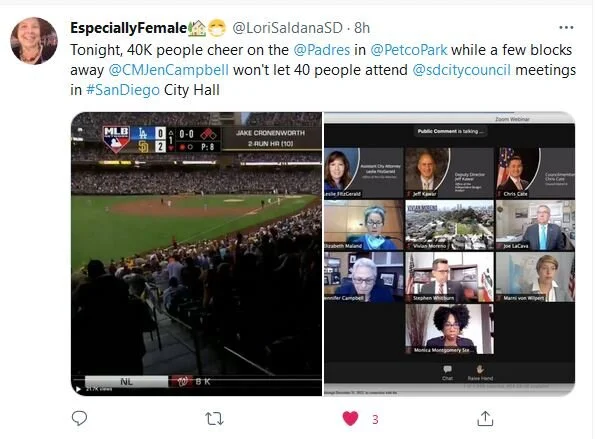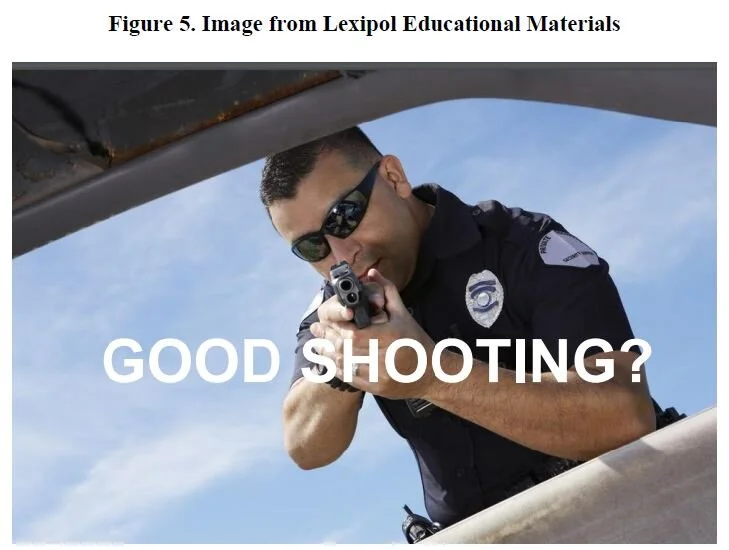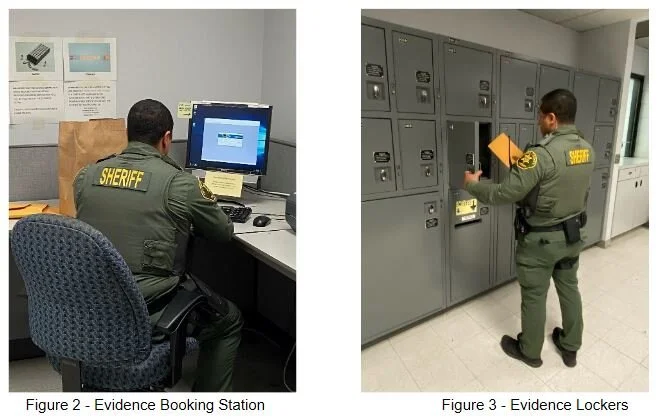On Twitter, Lori Saldana makes a good point. Perhaps the slow pace of governments re-opening to in-person interaction is just a function of the fact that they are not driven by the financial need to get people into the seats, as many businesses are. Whatever the case, these types of situations make clear what value some agencies place on public participation. The Orange County Register today has coverage of debates in OC about these issues, noting that Costa Mesa and Anaheim city councils have reopened to in-person attendance but that the Orange County Board of Supervisors is still trying to sort out its policy.
Study Highlights Impact of Race in San Diego Police Use of Force and searches
A study released Thursday by the Center for Policing Equity shows black San Diego residents are subjected to police force 4.8 times more often than white San Diego residents. Other studies, including one released in 2020 by KPBS, have shown similar patterns. SDSU researchers found the same problem in a study released in 2017, but the city was reported to have pressured the authors to water down the language of the study’s findings by, for example, changing the word “bias” to the word “disparities” in more than two dozen instances.
Black and LatinX San Diego residents are also more than twice as likely to be searched by police after being stopped than white residents, according to the new CPE study.
Profs. Eagly and Schwartz on Lexipol, a Company that Awkardly Straddles the Policing Policy and Lobbying Realms
UCLA Professors Ingrid Eagly and Joanna Schwartz have an interesting new article out on SSRN about Lexipol, a private company that develops policing policy for many public agencies and which, awkwardly, is simultaneously actively lobbying against reform around police use of force. As the authors put it,
Lexipol has taken an active role in opposition to proposed reforms of police use-of-force standards. Their advocacy extends far beyond the policies and trainings it provides its subscribers. Indeed, Lexipol has disseminated its anti-reform message in blogposts, white papers, informational webinars, and other materials provided to labor unions and political organizations
One can’t help noticing the proliferation of these private agencies with their corporate hands in the public’s business. You’ve got Lexipol writing the policies, Citizen and Ring fomenting a culture of paranoia, Granicus allowing the public documents to be shipped elsewhere, Critical Incident Videos acting as the PR arm for law enforcement, and so on.
Bakersfield City Council Clears Meeting Where Public Opposed Increase to Police Budget
Faced with raucous opposition from members of the public who criticized a $13.4 million increase to the budget of the Bakersfield Police Department, the Bakersfield City Council on Wednesday cleared the meeting chamber and then permitted only one person at a time to address the council. An ACLU legal and advocacy assistant stated that it appeared the council front-loaded pro-law enforcement comments and disproportionately restricted the time allotted to members of the public who called for budget cuts.
Activists outside the Bakersfiled City Council. Photo by Sam Morgen, Bakersfield Californian.
Orange County Grand Jury Report Sees Ongoing Problems in Sheriff's Evidence Handling
In the wake of a 2018 scandal stemming from the Orange County Sheriff’s mishandling of evidence, which resulted in charges being dismissed in 67 cases, the sheriff has worked to get its act together. But a Grand Jury report released this week concludes that there is still work to be done. In particular, the report calls for implementation of auditing and spot checks to prevent further problems, as well as better training for deputies around evidence booking facilities.
Hat Tip: Voice of OC.
LA Sheriff Villanueva: Law Enforcement Cliques Are "In Every Single Police Station, I Guarantee You."
KnockLA has coverage of the curious remarks of Los Angeles County Sheriff Alex Villanueva, who flatly denied the existence of law enforcement “gangs” on Wednesday but simultaneously stated “There’s cliques everywhere. Every single police station, I guarantee you… there’s nothing deviant or dark or scary about it.” Villanueva also referred to more than 700 department employees having been disciplined, apparently in connection with the effort to root out exactly this nonexistent phenomenon.
California Cities/Agencies Disregarding California Public Records Act Timelines
KTVU reported today that 2/3 of the people who file California Public Records Act requests in Oakland do not receive responses to their requests within the 10 days specified by the law, and that 59% of those surveyed found it “very difficult” to get the information they requested. The San Diego Unified School District was also in the news this week for its indifference to CPRA time limits, with the Voice of San Diego reporting that a paralegal who oversees requests for the district said he does not get records back related to requests within 10 days 95% of the time.
The pragmatic reality behind all of this is that the threat of litigation is the only real mechanism the public has to enforce these limits, but the notion of running to court merely because an agency has blown a tight deadline also poses certain challenges.
On PR firms RePackaging police Bodycam Video
KPBS’s Claire Trageser today re-shared her interesting 2020 writeup on Critical Incident Videos, a public relations company that the San Diego Police Department uses to repackage bodycam footage, a practice that allows the department to nominally comply with AB 748 while simultaneously turning that compliance into extensively edited spin that favors its own position.
Many other California police departments have taken a similar approach. KTVU reported on the Vallejo police’s use of this heavy editing, the San Jose Mercury News reported that Critical Incident Videos is consulting for “about 100 agencies up and down the state” on releases of video. We encountered similar massaging/editing of a bodycam video release in El Centro.
Hat tip: @jamesstout




